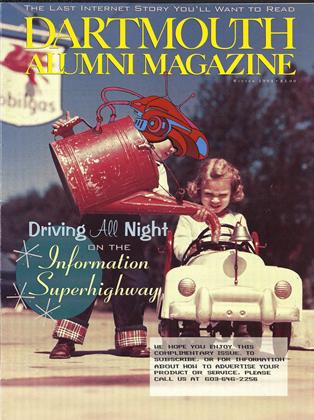One word could sum up Dartmouth's greatest strength (aside from its character building winters): accessibility. When a student wants to read a first edition of Moby-Dick, he can walk right in to Baker Library's Treasure Room and ask for it. When an undergraduate wants to study Machiavelli in Florence, she can employ any number of options. Student surveys rate the faculty as among the most approachable in the nation. The fitness facilities would make the Canyon Ranch envious.
Time-Sharing System installed dormitory terminals when electric typewriters were the latest thing. With their BASIC programming language, Professorsjohn Kemeny and Thomas Kurtz put software writing in the hands of mortals, paving the way for PCs. Dartmouth was the first institution to wire every dorm room for networking, the first to make Macintoshes widely accessible, among the first to require the purchase of a computer.
Now other schools have caught up and then some. The College still leads in research, thanks in part to the just built Sudikoff Computer Sciences Laboratory. But accessibility to the virtual world of the Internet, and even to other computers on campus, is slipping. Dartmouth continues to rely on a computer network that was built in 1979. While some speedy fiber-optic cables have been installed, most of the campus is wired with coaxial cables first class in 1979, ancient technology today.
The Kiewit Center offers students the latest in Macintosh computers, including the Power Macintosh, along with up-to-date software. But Kiewit is facing budget and staff cutbacks. Low salaries make the increasing offers from Apple and IBM more attractive to the brilliant young staffers. And Dartmouth's user-friendly electronic-mail system, Blitz Mail, is maxed out with 90,000 daily messages.
The capital campaign hopes to raise $3 million to endow computing at Dartmouth, and $6.15 million for "currentuse." This is a good sign that the administration is catching on. But we don't detect enough urgency on campus. Years ago, Dartmouth made the daunting commitment to be the best there is in computing. And for good reason: computers allow under graduates unprecedented access to research, conversations with people around the world, and a chance to communicate with faculty in the most efficient ways. The Net lets Dartmouth be at once a small, intimate college and a global institution.
Other colleges continue to suffer data envy when they look at us. But the winds of change blow fast in cyberspace. The College isn't giving the wizards in Kiewit enough to stay ahead.
 View Full Issue
View Full Issue
More From This Issue
-
 Cover Story
Cover StoryA Night Out on the Net
December 1994 By Jay Heinrichs -
 Feature
FeatureWhat We Do Best
December 1994 -
 Feature
FeatureAnti-Social Climbers
December 1994 By Tyler Stableford '96 -
 Article
ArticleDr. Wheelock's Journal
December 1994 By E. Wheelock -
 Article
ArticleTied Up with Strings
December 1994 By Karen Endicott -
 Article
ArticleThe Overarching Concern
December 1994 By JAMES O. FREED MAN
Article
-
 Article
ArticleRESIGNATION OF SECRETARY KNAPP
April 1917 -
 Article
ArticleMt. Washington Up!
JANUARY, 1927 -
 Article
ArticleConvocation of the Arts 1966
JUNE 1966 -
 Article
ArticleLacrosse
June 1955 By Cliff Jordan '45 -
 Article
ArticleHanover Browsing
January 1945 By HERBERT F. WEST '22 -
 Article
ArticleBurlington, Vt.
January 1942 By Willsie E. Brisbin '29.


